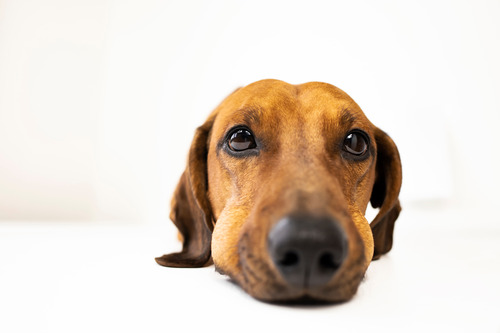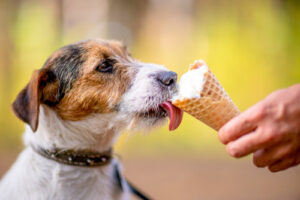Few things are more startling than watching your dog yelp, paw at their face, or jump back after a bee sting. While many stings are minor, the thought of your dog stung by a bee can instantly cause worry for any pet parent. Below, we’ll discuss what signs to look for, when to take action, and how your veterinarian can help to give you peace of mind if your pup encounters this painful surprise.
Why Dogs Get Stung by Bees
Dogs are naturally curious and love to investigate buzzing insects. A dog stung by a bee often gets too close while sniffing flowers, chasing bees in the yard, or lying in the grass where bees forage. Stings usually occur on the face, mouth, or paws, since these are the areas dogs use most when exploring. While bee stings are a common part of outdoor life, they can range from mild irritations to situations that require immediate veterinary care.
Common Symptoms of a Dog Stung by a Bee
When a dog stung by a bee comes running to you, the signs can be obvious or subtle depending on the reaction.
Typical Reactions
- Sudden yelping or whining after contact with a bee
- Swelling at the sting site (often the muzzle or paw)
- Redness or tenderness in the affected area
- Licking, chewing, or pawing at the spot
More Concerning Symptoms
In some cases, a dog stung by a bee may develop more serious reactions that require immediate veterinary attention. These may include:
- Vomiting or diarrhea
- Hives or widespread skin swelling
- Excessive drooling
- Difficulty breathing or wheezing
- Collapse or weakness
Any sign of difficulty breathing or severe swelling around the throat or face is an emergency and needs urgent veterinary care.
What Can Happen if a Dog Is Stung by a Bee?
Most dogs only experience temporary discomfort and localized swelling after a sting. However, some dogs can develop allergic reactions.
Mild vs. Severe Reactions
Mild reactions usually involve redness, itching, and swelling at the site of the sting. Severe reactions may include anaphylaxis, a rapid and potentially life-threatening allergic response. While rare, this makes it important for pet owners to pay attention to any unusual changes after a sting. A single bee sting can be unpleasant, but multiple stings increase the risk of more serious effects. If you suspect your dog disturbed a hive or was stung several times, contact your veterinarian right away.
When to Call Your Arvada Veterinarian
If you suspect your dog was stung by a bee, watch their symptoms closely. Some cases improve quickly, while others may worsen.
Call Arvada Veterinary Hospital if:
- Swelling spreads beyond the sting site
- Your dog has trouble breathing
- You see hives or widespread skin irritation
- Your dog is unusually lethargic or collapses
- Multiple stings occurred
Our team in Arvada, CO, can quickly evaluate your pet and provide treatment if needed. Call us at (303) 424-4439.
How Arvada Veterinary Hospital Help a Dog Stung by a Bee
If your dog needs care after a sting, your veterinarian can provide treatments tailored to their symptoms.
In-Clinic Care May Include:
- Antihistamines or medications to reduce allergic reactions
- Pain relief for comfort and swelling
- Oxygen therapy or IV fluids if breathing issues occur
- Monitoring to ensure your pet remains stable after treatment
By seeking veterinary attention, you can help your dog recover quickly and reduce the risk of complications.
What You Can Do to Prevent Bee Stings in Dogs
While you can’t avoid bees entirely, you can lower your dog’s chances of being stung.
Helpful Prevention Tips
- Keep your dog away from flowering plants where bees are active
- Supervise playtime in grassy areas during peak bee activity
- Avoid letting your dog snap at or chase bees
- Maintain your yard by checking for underground hives or nests
Even with precautions, a dog stung by a bee is always possible, which is why knowing what to look for matters.
Supporting Your Dog After a Sting
Seeing your dog in pain can be stressful, but acting quickly and reaching out to your veterinarian helps provide the care they need. Arvada Veterinary Hospital is here to support you if your dog was stung by a bee, whether the reaction is mild or more severe. If you notice concerning symptoms or want peace of mind, contact us at (303) 424-4439 or book an appointment online. Our veterinary team in Arvada, Colorado, is ready to provide the care and reassurance you and your pet deserve.





